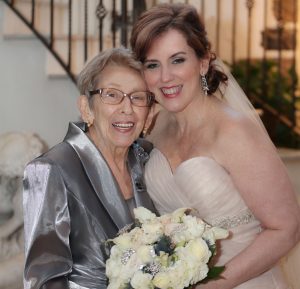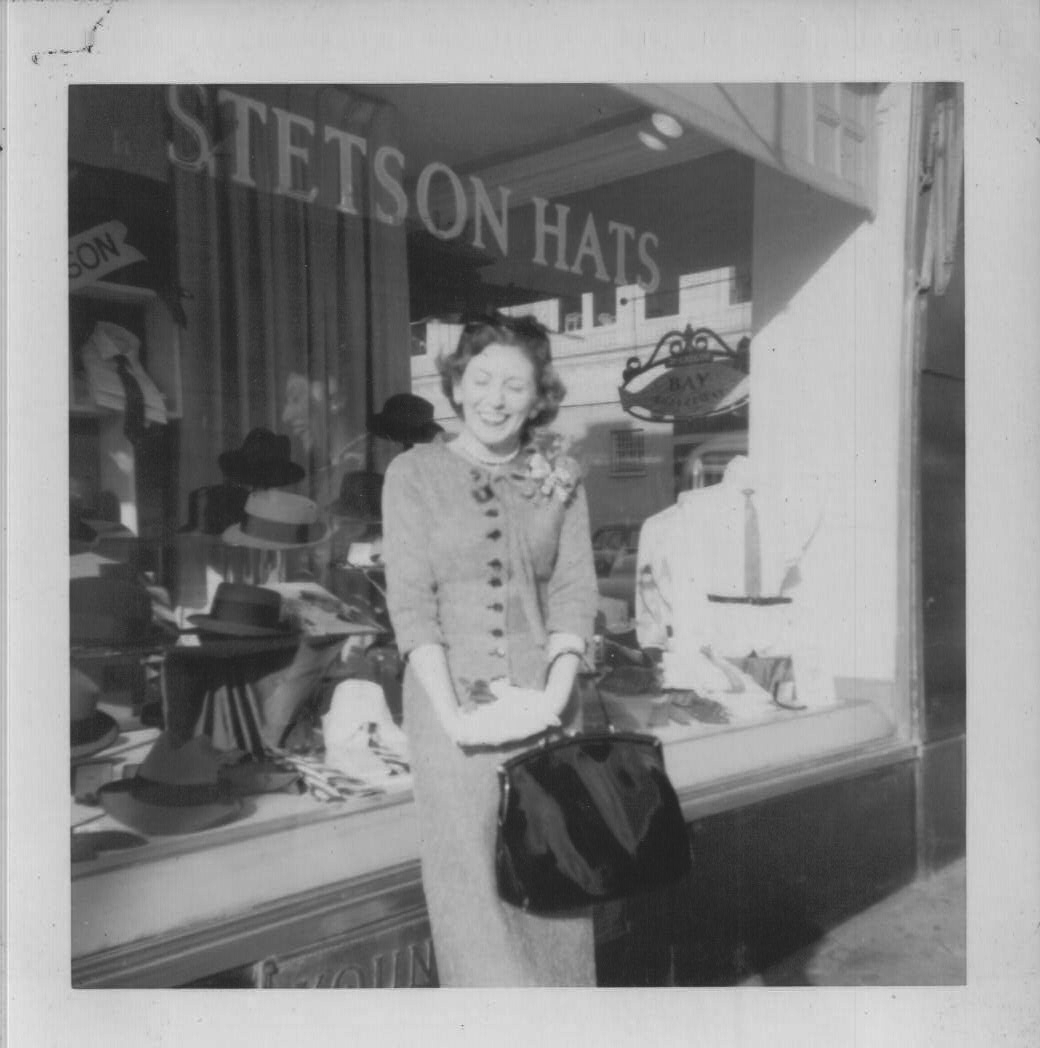Some Days It’s Impossible to Believe She’s Gone
How EFT Helped Me Care for My Mom
But every day, it’s impossible to believe that she went the way she did: penniless and in pain—on every level. She spent her final years beating herself up for making the biggest mistake of her life. She wanted to support herself with the money she’d taken a lifetime to save.  Instead, mom died embarrassed and heartbroken knowing the government had stolen her entire life savings and more because of a Medicare loophole.
Instead, mom died embarrassed and heartbroken knowing the government had stolen her entire life savings and more because of a Medicare loophole.
Mom was puttering around her Florida apartment late in the spring of 2012 when without warning, she heard, then felt, a loud crack. Her hip fractured and sent her flailing backward onto the floor. In agony, she called out to her dear friend next door who dialed 911. She was rushed to the hospital.
My brother and I both lived out of state and mom didn’t want to worry us. So intelligent and capable (she had graduated from both high school and business school by age 16), she “took care of everything,” then called to tell us that she was already checked in.
Concerned about our mother’s health, neither of us thought to ask how she had been admitted to the hospital. In fact, we had no idea that there was a right or wrong way to be admitted.
Her American Dream
 Born in 1924, my mother, Marion Geoghegan Campbell, began work in 1940 in the typing pool for Grace Shipping and quickly made her way up through the ranks, eventually leaving and becoming a paralegal. Marion helped set landmark cases in computer law.
Born in 1924, my mother, Marion Geoghegan Campbell, began work in 1940 in the typing pool for Grace Shipping and quickly made her way up through the ranks, eventually leaving and becoming a paralegal. Marion helped set landmark cases in computer law.
She was also a Catholic who wrote her Pope annually. She trusted in the honor of our country, her fellow Americans, and the agencies that were meant to serve and protect her.
At 86 she was healthy and sharp and could sign her name with assistance (her eyesight was failing); she had all documents—from grocery lists to greeting cards—read to her. And she wasn’t shy about asking people to jump in to help.
Long before her vision deteriorated, Marion read everything she could about Medicare. She went into her senior years understanding how it worked. She even researched the skilled nursing facilities in town so she’d have a plan in case anything unexpected happened. She understood that with a three-day hospital stay, Medicare would pay for 100 days of skilled nursing or rehabilitation.
So when a doctor at the hospital told her that she had to sign the paperwork or leave, she signed. She told us that she was doing so well after the fracture that the hospital was just keeping her “under observation” and that she was relieved not to be “admitted.” We all thought that was a good sign. Even though she was in pain, we assumed it meant she hadn’t been seriously injured.
The problem was that she was in no shape to understand or comprehend the hospital document she was signing. She was legally blind and a bit doped up, and it remains unclear whether or not anyone read her the fine print.
So my mother accidentally signed away her future because the papers she initialed said she understood Medicare’s special rule: that patients “under observation” do not qualify for skilled nursing care.
A Fateful Mistake
Six weeks later my fiancé and I sat in mom’s room at the rehabilitation facility to which she had been transferred. She had done her physical therapy daily and every afternoon we did EFT (Emotional Freedom Techniques, a form of acupressure) together over the phone.
The doctors were impressed with her progress. She worked hard because she wanted to walk down the aisle at her daughter’s wedding! We were finally going to take her home.
My mother held my hand and joked that my new engagement ring was so shiny she could now see clearly. She called each of her nurses and the rehabilitation staff into the room to show off the ring and her handsome future son-in-law.
Reports of my engagement spread like wildfire. Which is, apparently, how the billing manager discovered I was in the building. She barged into the room waving a wad of papers and demanded to see “the checkbook.” She said she’d “hate to put mom in collections…”
“My mother is fully insured,” I shot back. “We’ll take care of the paperwork at a more appropriate time.”
Suddenly, my mother was crying.
The woman who’d survived a world war cowered behind me, whispering that she didn’t know what she was going to do because the billing manager had been mean to her about the money for months. Assuming that there had been a mix-up, I ordered the billing manager to leave the room. Just then I turned and saw that my mother’s roommate was crying, too.
When I asked to see the executive director, I was told she wasn’t available. I went to her office anyway.
Apologizing for being so pushy, I explained that the billing manager had terrorized not only my mother but also her roommate. The director replied very politely that she would look into the behavior and assured me it was not their policy to harass patients.
I then turned my attention to the billing error. The director explained that since my mother had not been fully admitted to the hospital, Medicare’s 100 days of skilled nursing care had not been activated.
“Clearly there is some mistake,” I insisted. “Why would your staff admit my mother if she didn’t have Medicare coverage?”
“Your mother knew what she was doing when she signed our admission forms,” the director said. “She told us she has a savings account. She will be billed for our services.”
The walk back to mom’s room took a century. How was I going to tell her she’d made such a huge mistake? By the time I got to the room, I had resolved that we’d fight the system and do all we could to correct this terrible injustice. Mom was horrified to learn she’d signed away her rights and possibly her life savings but she too was confident we’d win in court.
The Dream is Broken
A week later we sat in the office of the best elder care attorney in town. Shaking his head in dismay, he told us that he hears stories like this several times a week. He was compassionate and gentle but advised us that there was indeed no mistake and there was nothing we could do except negotiate a better payment schedule.
I worked out a $100-a-month payment plan for my mother to cover the five-figure bill. The accounting department continued to send her phone calls and threatening letters. Unbeknownst to me, her spirit broken, mom finally wrote out a check to the nursing home for everything she had in savings, except for $1,000. But even paying the nursing home in a bulk didn’t begin to cover the total she owed for all the extra equipment and therapies they had offered her–and she had accepted–thinking she was covered.
So, for four years, instead of using her Social Security check to buy food, she spent it on her debt to the nursing home!
When we visited, her house looked spotless, her clothes clean; she did appear thinner and weaker, but we chalked it up to age. Mom never let on to us that she was starving herself and isolating herself to pay her bills.
She grew apart from her church community because she couldn’t afford the cab fare to services. She became frail due to malnutrition and had trouble caring for herself.
Finally, a visiting nurse found my 91-year old mother collapsed on her tile floor unable to get herself up. When the nurse phoned me after calling for the ambulance, I insisted mom be rushed to a hospital that I had researched ahead of time that had a history of caring for the elderly. Then I called her primary care doctor and insisted he have her fully admitted. He took over her case and signed the papers himself. Mom was going to require permanent, long-term care.
Next, I called the executive director of the nursing home that had treated her for the fractured hip four years earlier. It was still the best in town. I politely, but firmly, told her that mom wouldn’t be returning in her current condition had the system not failed her and stolen her money. Placing the blame on the system and not the nursing home, I concluded by telling her that it was the facility’s ethical duty to help mom now in her time of great need.
This time the executive director offered compassion and care: Mom was admitted that same day.
Her Last Wish: to Help Others
Mom spent two years in the nursing home, often joking that this or that was hers, because after all, she’d paid for it with her savings. The truth was she was horrified to be on Medicaid—the federal and state program for those with low or no income or assets. But it was the only way we could get her care. She’d worked for decades, saved, voted, fought and prayed but she ended up living “on the dole”—a burden to society—despite all her best efforts.
My mother was a fighter but this is how it ended for her.
One day mom began to talk about how this situation had impacted her emotionally. She apologized for her mistake and what it had cost her and what it had cost us—the tens of thousands of dollars we pitched in for housekeepers and nurses so she could remain at home. Mom lamented that she was too old and frail to do anything about it, so she made me promise I’d tell everyone I could about this horrible Medicare rule and help others avoid her fate. At least a dozen times before she died I called her to say, “Mom! You saved another one!” and gave her the details of some friend or family member who had used her knowledge, her mistake to protect themselves. And she would say, “Well then, dear, my prayers have been answered and my pain has meaning.”
WHAT YOU CAN DO TO HELP YOUR LOVED ONES
1. Understand the loophole Tell everyone. Shout it from the rooftops. Make sure your parents, siblings, friends, colleagues, and neighbors understand about the Medicare “Observation” loophole. Remind them to insist on being fully admitted should they or anyone they love be hospitalized. The rule: Medicare only covers skilled nursing facility care with a “qualifying” inpatient hospital stay. A qualifying inpatient hospital stay means your loved one has been a hospital inpatient, formally admitted to the hospital after their doctor writes an inpatient admission order, for at least 3 days in a row (counting the day of admittance as an inpatient, but not counting the day of discharge).
2. Protect your rights You have time to understand what you’re being asked to sign. You always have the right to have your attorney review any paperwork before you sign. Tests, medications, and assessments can, and often must, be administered before the doctor can choose the correct designation, that is, whether your status is “under observation” or “admitted.” Advocate for yourself or your loved one.
3. Understand your signature is permanent Changing the hospital stay designation after the fact is nearly completely impossible. The time to get it right is at the beginning, so understanding the process and taking the right actions up front is your best protection.
4. Make decisions from a place of calm Emotions are painful and powerful in the midst of a parent’s illness or injury. The worst decisions are made in overly emotional states. Learn processing skills like EFT, a self-applied acupressure technique, to help process stress and painful emotions like fear so you can make decisions from a calm, secure position.
5. Be prepared Engage an elder care attorney early. You will need one to create your power of attorney document when you need to take over the decision-making process for an impaired parent, but also so you have someone in place to handle a legal challenge if one arises. The phrase “my attorney will need to review” can be amazingly effective in securing the cooperation of medical and billing personnel.
6. Involve your parent’s primary care doctor Discuss the Medicare loophole with your parent’s primary care doctor ahead of time and make sure they will help obtain the proper designation if the need arises. The physician of record can sway things and if they have hospital privileges they have even more power. Have the same conversation with any specialists such as your parent’s cardiologist, surgeon or oncologist. At the time of hospitalization, call in all the troops and reference whatever issues or list of symptoms you can to secure the proper designation.
7. Review your hospitals Research local hospitals to determine how cooperative they are with admitting. Hospitals and doctors have quotas to meet and guidelines to follow if the doctor or hospital wants to get Medicare reimbursement. They are penalized for not obeying the rules. But different hospitals have different concerns about the rules. Same for doctors–who might be wealthy enough to forgo the reimbursement. Ask friends, your physician and even contact hospitals directly. Some will advise you about their policies up front. Write down the name of your designated emergency hospital on a card your parent can keep in his or her wallet. Make sure your parents know that if you are not there to advocate for them, they should insist on being brought to the designated hospital.
8. Confirm, confirm, confirm Check your loved one’s patient status daily until s/he is discharged. Sometimes doctors change the status, but sometimes hospital administrators press the issue forcing doctors to downgrade a patient during the stay. Remember, patients need to be fully admitted into the hospital for three days in order for Medicare to kick in. If that admission status changes at any time, the clock restarts.
9. Learn the lingo By law since March 2017, hospitals must advise you what the patient’s designation is and exactly what that means in terms of financial obligations and how that designation affects the patient’s insurance. But remember: the hospital isn’t there to protect your parent’s rights; it’s there to protect their requirements under the law and their own management. Terms like “downgraded to observation” could make it seem like the patient is getting better when in fact it simply means the patient has been switched to a lower status under Medicare. If they need to go to skilled nursing, they’ll have to pay out of their own pocket.
10. Work the system If you don’t get the proper designation, try again by checking out of the hospital and then in again a day or so later. A new hospital, another doctor or a new administrator might make all the difference. Or, sadly, a few more days might mean the condition has progressed enough to truly require more care.
11. Try again Even if your loved one does end up in a nursing home after an “observation status” hospital stay, voiding Medicare coverage, you can try to have them sent back to the hospital for a new stay and insist they be fully admitted. Once they are fully admitted for a three-day stay, the clock begins again and they can access their full 100 days of coverage.
12. What to do if all else fails Realize that skilled nursing care isn’t a stay at the spa and often it’s nothing you can’t do at home yourself. Exercises for the elderly are very simple; it’s the repetition that counts. Provided your loved ones can make bathroom visits themselves you might find taking them to your home or getting them in-home nursing is a better answer. Plus, many people find they heal better in their own home environment. If your loved one has no assets, many home-care services will be completely covered by Medicare or even Medicaid. Services such as bathing, wound care, meal prep and housekeeping can be obtained with just a few phone calls.
This article first was first featured on the popular Covey Club, the lifelong learning community created by editing icon Lesley Jane Seymour.
UPDATE: My mother’s prayers and her requests she personally made and on her behalf via notes to Congress PLUS all the Conscious Manifesting work done to resolve this terrible issue have been answered! Congress passed a new law signed by President Obama requiring hospitals to clearly explain what “observation status” means for patients and the financial consequences for them and what their rights are with Medicare. Many people and agencies worked tirelessly to resolve this issue, such as AARP. However, please don’t assume this means all needs will be met. Laws are updated and change, and the implementation of laws and regulations can’t be guaranteed. Please remember: Ask questions, research and get proper representation. And always use your EFT Tapping to help you throughout the entire process!
Cathleen’s support during the last few years of both my parents’ lives was invaluable. As soon as we started working together Cat gave me a copy of her article about her Mom’s experience with Medicare, which helped us avoid that same fate, three times. Because Cat had been through this herself she knew how stressful it could all be. She helped me give myself permission to have my painful feelings and then taught me the tools to let them go. I used EFT tapping, essential oils and flower remedies daily. Sometimes my parents would let me help them when they got upset and we’d tap together or try an oil. Cat gave me an exercise which was incredibly hard to do but also a pivotal part of my being able to heal overwhelming grief when they passed. We had conversations that were deeply loving, something my practical parents weren’t always able to do before. In the end, I was able to work through the profound grief with a calm grace I would never have known without this work. Sometimes I have a sharp pain of missing Mom or a melancholy because I want to pick up the phone to talk to my Dad, but I can release whatever I’m feeling quickly. I’m really grateful so grateful.





